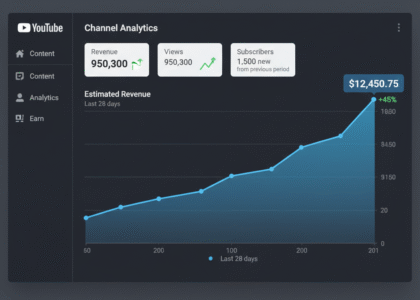Creating a monthly budget might feel like a chore, but it’s one of the most powerful tools to take control of your finances. A well-planned budget can help you manage your income, reduce unnecessary expenses, and achieve your financial goals faster. In this article, we’ll walk you through how to create a monthly budget that works, offering actionable tips and strategies to get you started on the path to financial success.
Why You Need a Monthly Budget
A monthly budget isn’t just about limiting your spending; it’s about creating financial freedom. Here’s why budgeting matters:
- Prevents overspending: It ensures you’re living within your means.
- Helps you save: You can allocate funds for short- and long-term goals.
- Reduces stress: A clear plan minimizes the anxiety of financial uncertainty.
Whether you’re saving for a dream vacation, paying off debt, or just trying to cover your bills, a budget is your financial roadmap.
Steps to Create a Monthly Budget That Works
1. Determine Your Monthly Income
Start by identifying your total monthly income. This includes:
- Your salary after taxes (take-home pay).
- Additional sources of income, such as freelance work or side hustles.
- Passive income from investments, rental properties, or other sources.
Knowing exactly how much money you have helps you set realistic spending and saving goals.
2. Track Your Expenses
Before you create a budget, you need to know where your money is going. Break your expenses into categories, such as:
- Fixed expenses: Rent, utilities, insurance, subscriptions.
- Variable expenses: Groceries, transportation, entertainment, dining out.
- Occasional expenses: Gifts, medical bills, or annual memberships.

Use tools like spreadsheets, budgeting apps, or simply jot it down in a notebook. This step is crucial for spotting areas where you might overspend.
3. Set Financial Goals
Ask yourself what you want to achieve financially. Your goals can be:
- Short-term: Saving for a new gadget, paying off credit card debt.
- Long-term: Building an emergency fund, saving for retirement.
Your goals will help you prioritize where your money should go each month.
Creating the Budget: The 50/30/20 Rule
One of the simplest ways to structure a budget is using the 50/30/20 rule:
- 50% for Needs: Essentials like housing, utilities, groceries, and transportation.
- 30% for Wants: Entertainment, dining out, hobbies, and non-essential items.
- 20% for Savings and Debt Repayment: Emergency funds, retirement savings, and paying down debts.
If your expenses exceed your income, start by trimming the “Wants” category.
Tools to Simplify Budgeting
1. Budgeting Apps
Apps like Mint, You Need a Budget (YNAB), or EveryDollar can automate tracking and make budgeting easy.
2. Spreadsheets
Google Sheets or Excel templates are great for creating a customized budget.
3. Envelope System
This old-school method involves allocating cash for specific categories and spending only what’s in the envelope.
Tips for Sticking to Your Budget
- Review your budget regularly: Life changes, and so do expenses. Revisit your budget monthly to ensure it’s still relevant.
- Use cash for discretionary spending: It’s harder to overspend when you’re not using a card.
- Celebrate small wins: Reward yourself for sticking to your budget, even if it’s just a coffee from your favorite cafe.
Common Budgeting Mistakes to Avoid
1. Ignoring Small Expenses
Those daily lattes add up! Track every expense to avoid budget leaks.
2. Forgetting Irregular Costs
Include occasional expenses, like holiday gifts or annual subscriptions, to avoid surprises.
3. Being Unrealistic
A strict budget that leaves no room for fun is bound to fail. Find a balance.
Benefits of a Well-Managed Budget

- Builds savings for emergencies and future goals.
- Helps you reduce debt faster.
- Gives you the freedom to spend money on what truly matters.
Discover More Tips on Financial Freedom
A monthly budget is your first step toward financial control and peace of mind. Start small, stay consistent, and watch your efforts pay off.
Want to learn more about achieving your financial goals? Explore GetCashVibe today and take charge of your finances like never before!
Don’t stop here! Discover more personal finance advice on GetCashVibe and take your budgeting skills to the next level!






